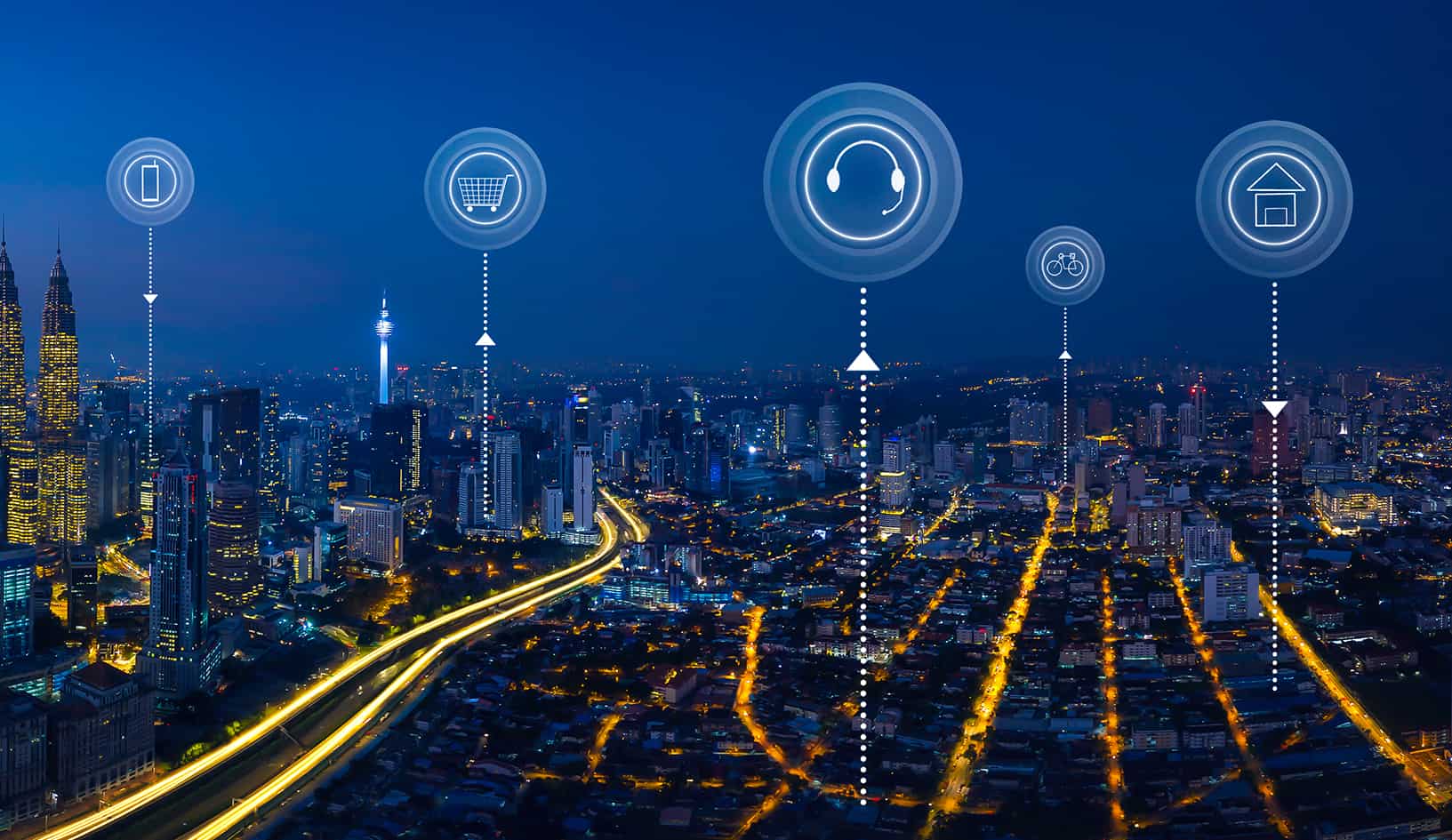
The smart city in all its forms
INTRODUCTION : HISTORIQUE DE LA NOTION ET DE SON EVOLUTION
L’idée d’une « ville intelligente » serait sortie d’un défi lancé en 2005 par Bill Clinton à John Chambers, président de Cisco. Le fabricant américain d’équipements pour réseaux numériques se disait fasciné par un projet lancé dans la ville sud-coréenne de Songdo : un quartier high-tech, truffé de capteurs qui collectent et traitent des quantités massives de données.
« Oui, mais à quoi bon ? aurait répondu Bill Clinton. Pourquoi ne pas utiliser les outils technologiques pour rendre les villes intelligentes (smart) et plus durables ? » Cisco débloque alors un budget de recherche de 25 millions de dollars pour faire évoluer le projet de la ville de Songdo d’une version 1.0 à une version smart city 2.0 : « Une ville durable, selon sa propre définition, qui combine une infrastructure traditionnelle [des îlots bâtis, des jardins…] avec la technologie, pour enrichir la vie des citoyens ».
Each town has its own characteristics with very different objectives..."
‐ Nicolas Monsarrat, Executive Director of Accenture France
“Chaque ville a ses caractéristiques propres, avec des objectifs très différents”, souligne Nicolas Monsarrat, directeur exécutif d’Accenture France. Une « smart city », c’est une ville qui utilise le numérique afin de les atteindre : Jeddah, en Arabie Saoudite, pour accueillir les pèlerins de la meilleure manière, ou Neom [« la nouvelle ville du futur »] pour développer le tourisme. Dubaï, pour attirer les talents internationaux et développer leur économie, Helsinki, et plus particulièrement le quartier de Kalasatama, pour faire de la ville un bel endroit à vivre. »
Les initiatives que lancent les smart cities entendent, par exemple, améliorer certains services : la sécurité (via la vidéo protection et la sécurisation des données), le transport (en garantissant une gestion intelligente du trafic, en ouvrant la voie aux véhicules autonomes), l’énergie (grâce à des réseaux électriques intelligents, les smart grids, ou une gestion économe des bâtiments), la connectivité (avec un WiFi public gratuit et la connexion du mobilier urbain), l’accès à distance aux services administratifs (à travers des plateformes d’e-services ou des applications mobiles).
Une nouvelle approche de la smart city – une version 3.0 – a émergé il y a quelques années dans des villes européennes comme Barcelone, Vienne ou Lyon. Conformément à la loi, elles partagent leurs données avec les habitants, tout en favorisant une utilisation participative. Ainsi chaque citoyen devient acteur de « la ville intelligente » soit en produisant de la data via des capteurs, soit en l’utilisant pour proposer des services urbains qui prennent en compte les usages et les besoins. En impliquant ses citoyens, elle corrige un travers, souvent critiqué, qui consiste à considérer chaque problème de la vie urbaine comme un problème technologique.

How do towns/cities seize the smart city?
Depuis les années 2010, de plus en plus de municipalités mènent des projets de smart city pour concevoir des villes agréables à vivre et adaptées aux enjeux actuels et à venir (sociaux, sanitaires, économiques ou climatiques).
Voilà un chiffre qui atteste de l’intérêt des villes et territoires pour les smart cities : plus de 95,8 milliards de dollars d’investissements technologiques ont été consacrés à ce modèle dans le monde en 2019, selon l’International data corporation (IDC). Et ces dépenses atteindront 189,5 milliards de dollars en 2023. En tête, Singapour, indétrônable premier investisseur de la ville intelligente, suivie de New York, Tokyo, Londres, Pékin et Shanghai. Chacune annonce dépasser en 2020 la barre du milliard de dollars d’investissement.
Quelles que soient les sommes engagées, la manière dont les villes s’emparent du concept relève, semble-t-il, de trois visions différentes. Une vision techno-centrée, qui pousse une ville riche comme Singapour à miser notamment sur l’IA pour gérer, de façon toujours plus performante, tous les aspects de la vie de ses habitants, en particulier leur sécurité, fût-ce au détriment de leur liberté. Une vision pragmatique, pour la plupart des villes occidentales : les outils numériques sont intéressants, mais ne répondront qu’à une partie des problèmes urgents et concrets auxquels elles sont confrontées. Une vision humaniste, politique, enfin, à Barcelone ou à Dijon, qui n’exclut pas les deux premières, mais considère « la révolution numérique » comme une occasion d’interroger les modèles actuels et de réinventer la communauté urbaine, avec des « smart citizens ».
SAFE CITY : ANTICIPER TOUTES LES CRISES
« Qu’est-ce qui vous fait aimer Singapour ? – C’est une ville safe. L’eau est safe, les rues sont safe, les jardins sont safe. » Nicolas Monsarrat, directeur exécutif d’Accenture France, aime à rappeler cet échange avec un chauffeur de taxi, lors d’un trajet de l’aéroport à son bureau, pour illustrer le rapport étroit entre smart city et sécurité. La smart city qu’est Singapour donne l’assurance à ses habitants qu’elle est capable de traverser toutes les turbulences et d’encaisser tous les chocs. Depuis 2014, elle développe, dans le cadre de son plan « Smart Nation », un Innovation Center for Situational Awareness, dont le programme s’est ouvert en janvier 2020 aux autres organisations de santé publique, pour protéger les citoyens. Une intelligence artificielle permet de faire ce que l’homme ne saurait réaliser : élaborer toutes les situations de crise possibles et imaginables, les anticiper et y répondre.
Un des effets de ce programme ? Sa gestion du coronavirus, saluée en mars 2020 par des autorités scientifiques américaines, comme Mickael Osterholm, directeur du Centre de recherche sur les maladies infectieuses de l’université du Minnesota : seulement 18 morts à déplorer, très peu de dispersion de l’infection, alors que la densité de la population est très forte et le risque extrêmement élevé. Ses méthodes : le « contact tracking », une surveillance assidue des personnes détectées positives au coronavirus et assignées à résidence, et la transparence vis-à-vis de la population. Il est possible de localiser les malades, en temps réel, sur une une carte interactive, mentionnant leur âge, leur sexe, leur nationalité, et la rue où elles vivent. Leur nom en revanche n’est pas divulgué.
Certaines de ces mesures font débat en France, mais elles contribuent à la réussite du challenge auquel est confrontée Singapour. Celui de rester attractive et d’attirer des talents alors que cette cité-État n’est qu’une petite enclave à la pointe sud de la Malaisie, sans ressource énergétique ni agricole.
RÉALISER DES ECONOMIES
Singapour reste un modèle à part. La plupart des villes occidentales, selon Ben Green, l’auteur de The smart enough city (2019), « rêvent d’obtenir ses résultats, alors que son modèle n’est pas reproductible » : ses atteintes aux droits de l’homme sont dénoncées de façon récurrente par l’ONG Human Rights Watch. Nos villes françaises, dans leur majorité, se sont emparées des outils numériques sans véritable vision politique à long-terme, les expérimentent sur une partie de leur territoire pour résoudre leurs problèmes financiers, faire des économies d’électricité et d’eau, par exemple. Une observation partagée par Constance Nebbula, conseillère municipale d’Angers, déléguée au numérique, à l’innovation et à la smart city.
La France compte 27 smart cities françaises. Selon la Gazette des communes 15 ont moins de 260 000 habitants, et deux se distinguent : Dijon, puis Angers. Leurs budgets respectifs : 105 millions d’euros pour la première, 178 pour la seconde, seront rentabilisés dans deux décennies, grâce aux économies réalisées. Les projets permettront d’optimiser le fonctionnement de l’ensemble des services de la ville (transport, sécurité, éclairage, gestion des déchets…), avec la construction d’un hyperviseur, une sorte de poste de pilotage central dont la conception et la maintenance ont été confiées par Dijon à un consortium privé composé de Bouygues Energie et Services, Citelium (filiale d’EDF), Suez et Cap Gemini ; Angers a confié le sien à un consortium mené par Engie Ineo, aux côtés de Suez, La Poste et VYV.
« L’HUMAIN AU COEUR DE LA SMART CITY »
« La création de “Dijon métropole intelligente et connectée” est d’abord une démarche collaborative, indique la ville sur son site. Cette métropole intelligente s’élabore grâce à la réunion des idées et des forces créatives des habitants des 23 communes et de l’ensemble des acteurs du territoire. » Une démarche suivie également par nombre de métropoles, qui mettent à la disposition des citadins des applications pour mesurer la qualité de l’air – et inviter à participer à son amélioration, dans le cadre d’un projet comme le fait Paris avec son Plan Climat Air Energie – ou pour signaler un problème, grâce à des applications comme 311 à New York, ou DansMaRue, à Paris, afin de permettre à la ville de les traiter efficacement.
Pionnière en matière de démocratie participative, Vancouver a été la première à partager en 2009 « librement, avec les citoyens, les entreprises et autres juridictions, la plus grande quantité de données possible en respectant la vie privée et la sécurité ». « Lorsque les données sont partagées librement, les citoyens ont la possibilité de les utiliser, de les convertir, favorisant ainsi la création d’une cité plus dynamique économiquement, et plus respectueuse de l’environnement », justifie alors le Conseil municipal.
Barcelone suit son exemple en 2010, et, via le site OpendataBCN, propose chaque année aux habitants de s’appuyer sur ses données pour l’aider à relever les défis politiques, sociétaux ou environnementaux auxquels elle est confrontée. Paris fait de même depuis 2011. Depuis, l’ouverture des données a été rendue obligatoire pour toutes les communes françaises, par la loi Lemaire pour une République numérique, en 2016. « Nous avons lancé notre projet Smart Geneva après avoir ouvert nos données aux citoyens. Ainsi nous pourrons construire, ensemble, une smart city. », témoigne Patrick Montier, chef du projet Smart Geneva. C’est devenu le leitmotiv des porteurs de la smart city centrée sur l’humain : la smart city ne se fera pas sans smart citizens.

Controlling urban data is central to the challenges for the smart city
SANS LA MAÎTRISE DE SES DONNÉES, PUBLIQUES OU PRIVÉES, LA VILLE NE PEUT GARANTIR SA SOUVERAINETÉ
Surnommée « datapolis » par le journaliste Francis Pisani, la smart city, lors de son émergence au début des années 2000, n’a pas manqué de soulever des inquiétudes, pour ses collectes massives de données. Leur croissance est exponentielle, avec l’apparition de toujours plus de capteurs ou de caméras de vidéo-protection qui promettent d’améliorer la vie des citoyens… mais aussi la santé économique des entreprises qui les fournissent, comme IBM ou Decaux.
La maîtrise des données urbaines produites par ces capteurs est un enjeu de taille pour les municipalités. Car elle seule lui permettra de garantir sa souveraineté et de réparer une asymétrie des pouvoirs, entre public et privé, d’associer davantage ses citoyens à la vie démocratique, et de garantir la protection de la vie personnelle inscrite depuis 2018 dans la Constitution.
DATA CITOYENNE ET GRANDS GROUPES
La protection des droits des citoyens, comme de la vie privée, est difficilement conciliable avec le principe de « gratuité vertueuse » (par exemple le Wi-Fi gratuit contre le recueil de données), auquel cèdent souvent les municipalités. En France, Grenoble a fait figure d’exception en déboutant de l’espace public un acteur du mobilier urbain connecté. Les bornes LinkNYC, installées dans New York par Sidewalk Labs, une filiale d’Alphabet, après avoir remporté un appel à projet visant à réinventer les cabines téléphoniques, ne proposent pas pour rien « le plus grand et le plus performant WiFi gratuit jamais proposé par une ville ». En ville comme sur le net, « quand un produit est gratuit, c’est que vous êtes le produit », prévient un adage.
Le problème de la captation des données personnelles et de leur gestion se pose également dans le cadre des partenariats public-privé engagés dans les projets de smart city. En France, les données personnelles restent sous la gouvernance des villes. Le contrôle en est gardé par le service public qui est « tiers de confiance ». Pour développer la capacité des territoires à gérer le partage de données, des initiatives sont lancées, comme DataCités 2, menée par Chronos et Ouishare ; elle accompagne plusieurs territoires, en collaboration avec des partenaires tels que la Banque des Territoires, l’ADEME, le CGET, Bouygues Construction et Bouygues Energies & Services. Une restitution de ces travaux aura lieu fin juin 2020. Un soutien bienvenu : fin 2019, plus de 60% des communes n’avaient pas encore nommé de Data Protection Officer (DPO), selon le Journal du Net, pourtant imposé par le Règlement général sur la protection des données (RGPD).
Il arrive cependant que certains acteurs privés refusent de partager leurs data avec les collectivités pour servir l’intérêt général. Au nom de ce principe, New York a forcé Uber en 2017 à les communiquer, pour améliorer la circulation des taxis. Mais le groupe les a restituées à la ville anonymisées et regroupées très schématiquement sous des thématiques…
La méfiance des citoyens à l’égard du contrôle et de l’usage de leurs renseignements personnels s’est notamment manifestée au Canada à Toronto, dès l’annonce du projet futuriste du quartier Quayside conçu par Sidewalk Labs, surnommé « Google city ». Depuis 2018, un collectif de citoyens, mené par Bianca Wylie, est mobilisé pour que les parties prenantes, Sidewalk, mais aussi Waterfront Toronto, l’organisme qui associe la province, la ville et le gouvernement, revoient leur contrat. Le collectif a ainsi obtenu des pouvoirs publics, fin 2019, « de limiter le périmètre des futurs aménagements, et d’imposer que les données collectées soient gérées par une entité publique et stockées au Canada », souligne Le Monde, prouvant que les citoyens peuvent aider leurs représentants à défendre l’intérêt général.
DATA CITOYENNE ET MUNICIPALITÉ
Au delà de cet exemple, l’inquiétude sur la capacité des villes à garantir la liberté et l’anonymat des citoyens en ville se lit sur les réseaux sociaux, sur Twitter par exemple où le hashtag #smartcity a été employé 180 millions de fois en 2018.
L’usage des données par les régimes démocratiques totalitaires font les grands titres depuis quelques années, et alimentent cette insécurité. En Chine, les caméras de vidéosurveillance intégrant des systèmes de reconnaissance faciale, fournies par les entreprise comme Huawei pour mener leur politique « safe city », font peur jusqu’en France ! « Le géant chinois fait cadeau de plus de 200 caméras dernier cri à la ville de Valenciennes pour moderniser son système de vidéosurveillance », titre 20 minutes en janvier 2020, de manière provocatrice.
L’utilisation des données par nos démocraties occidentales est également redoutée. Le think tank américain Rank Corporation met en garde, dans un rapport publié en 2017, contre les logiciels prédictifs de crimes, comme Crime Scan ou PredPol, utilisés à Los Angeles ou Atlanta, qui, à cause des biais raciaux des algorithmes, renforcent les préjugés. Ne pourraient-ils pas plutôt aider à prévenir les crimes en mobilisant des services sociaux sur les lieux « à risque », en allant chercher les problèmes de délinquance à la source ?
DATA ET HACKERS
Enfin, la fiabilité des outils eux-mêmes est remise en cause. Les actes de cyber-malveillance ne visent pas que les groupes privés. « Une cyber-attaque « massive » de la ville de Marseille, sa région et sa métropole » a été révélée par la presse le 15 mars 2020. C’est d’ailleurs une fuite de données, remarquée par un groupe de hackers en mars 2019, qui a donné à l’Occident un aperçu de la surveillance chinoise, visant des centaines de millions de personnes.
Dans une ville aux multiples objets connectés, du mobilier urbain au tourniquet de métro, plus les points d’entrée se multiplient, plus les risques le sont aussi. Construire des murailles autour des données comme des firewall, les crypter, multiplier les mots de passe ne garantissent pas le risque 0 : il n’existe pas. Comme il n’existe pas de protection infaillible, les municipalités tablent à la fois sur la sécurité préventive et l’efficacité de la réaction à la cyber-attaque.
« Il y a tout un travail à mener sur le numérique responsable, conclut Constance Nebbula, la conseillère au numérique de la ville d’Angers. Et il doit inclure la pollution générée par le numérique. C’est devenu une nouvelle priorité pour les villes connectées ». Un paradoxe de plus que les smart cities devront résoudre.
Living (differently) in the smart city: tomorrow will we all be cyborgs or smart citizens?
QUAND LA SCIENCE-FICTION ÉCLAIRE L’AVENIR : interview croisée de Yannick Rumpala, maître de conférence en science politique à l’Université de Nice, spécialiste des projets de transition écologique ; et Patrick Montier, manager du projet Smart Geneva au Département du territoire (DT), République et Canton de Genève. Interview croisée.

YANNICK RUMPALA, DANS HORS DES DÉCOMBRES DU MONDE (2018), VOUS PROPOSEZ DE DÉFINIR NOTRE ÈRE COMME « CYBORGCÈNE », AU LIEU D’« ANTHROPOCÈNE », POURQUOI ?
YANNICK RUMPALA (YR) : La surface terrestre est de plus en plus occupée par la sphère technologique. Les câbles, les fils électriques et les ondes maillent de réseaux visibles et invisibles la planète : le terme de cyborgs, habituellement réservé aux personnages de science-fiction mêlant l’organique et le ‘machinique’, peut aussi leur être appliqué. Cette transformation continue affecte les individus.
EN QUOI ?
YR : Les objets technologiques qui s’imposent pour se déplacer dans la ville, participer à ses activités, faire corps avec elle, deviennent un prolongement des citoyens, des espèces de prothèses. Les smartphones ne quittent plus la main. Certains, en Suède, se sont fait implanter une puce sous la peau pour remplacer leur carte de crédit, leur billet de train, etc. Les voitures, devenues des bulles suréquipées, « augmentent » l’individu. Dans un habitacle on fait corps avec la machine, les fabricants de « voiture intelligente » l’ont bien compris.
PATRICK MONTIER (PM) : Dans leurs premières versions, les villes connectées sont très inquiétantes. Je pense à Singapour, avec ses « super-arbres » artificiels pleins de capteurs. Il y a encore des gens qui croient que l’homme trouvera des solutions pour régler les problèmes qu’il a engendrés, grâce à la technologie. Cette logique nous amènera à vivre des scénarios de dystopies, dont certaines smart cities sont déjà très proches, des villes où l’homme est augmenté, connecté aux autres hommes et aux objets par la technologie. C’est vers ce type d’avenir que les GAFA poussent les cités, quand ils tentent d’en prendre le contrôle avec des projets comme Quayside, à Toronto.
LA RÉALITÉ EST-ELLE EN TRAIN DE REJOINDRE LA SCIENCE-FICTION ? LA LITTÉRATURE PEUT-ELLE NOUS AIDER A ANTICIPER LE FUTUR ET PERMETTRE DE FAIRE LES BONS CHOIX EN AMONT ?
YR : Les bonnes œuvres de science-fiction nous confrontent aux conséquences des technologies. Jusqu’où la logique de dépendance au portable pourra-t-elle aller, par exemple ? Lauren Beukes, dans Moxyland, représente des habitants soumis à l’obligation du port du smartphone. La moindre opération de la vie courante passe par lui. La police peut même s’en servir pour punir un citoyen par décharges électriques. Un opérateur ou un gouvernement ne seront-t-ils pas un jour techniquement tentés le faire ? Jusqu’à quel point notre « prothèse » régentera-t-elle notre quotidien ?
Le rôle presque prédictif de la science-fiction intéresse d’ailleurs les institutions : l’armée américaine a fait appel à des auteurs qui ont mis en scène des invasions de zombies, pour se préparer à des scénarios d’épidémies et anticiper les réactions à avoir. Souvent, ce qui arrive, c’est ce qui n’a pas été prévu. Comme l’avait dit l’auteur américain Frederik Pohl : « Une bonne histoire de science-fiction devrait être capable de prédire non pas l’automobile, mais l’embouteillage ».
DANS UN PROJET DE SMART CITY, L’INDIVIDU EST-IL CONDAMNE A SE « CYBORGISER » TOUJOURS DAVANTAGE ?
PM : Ce n’est pas du tout la vision de Genève, où l’urgence écologique a été votée en 2019. Elle développe un plan cantonal de développement durable s’appuyant sur trois piliers : l’environnement, le social et l’économie. « Smart Geneva » c’est un projet et une plateforme, qui réunit une communauté d’acteurs de 45 communes, dont les villes françaises limitrophes (le Grand Genève), pour répondre à la question : comment fait-on pour conserver la biodiversité et nos valeurs morales et civiques ?
Nous pensons que la technologie peut être un outil utile quand elle contribue réellement à diminuer la pollution, lumineuse et sonore par exemple. C’est pour cela que nous allons utiliser des capteurs pour limiter l’usage de la lumière artificielle, et contrôler le bruit, les vibrations et l’évolution des chantiers. Mais avant cela, il faut veiller à ce que le matériel soit approprié : choisir des lampadaires qui éclairent vers le bas, et pas vers le haut, par exemple ; cela a des effets néfastes sur la faune et la flore.
Nous avons mené une étude auprès de 5000 personnes, en 2019, dans le cadre de Genève 2050. Leurs premières préoccupations : avoir du lien social, un air de qualité, se sentir en sécurité, dans une ville préservée des incivilités. Ce qui soulève une question: est-ce que la technologie peut aider à tout cela à la fois, et comment ?
YR : Oui, c’est possible, mais à condition que les citoyens arrivent à se réapproprier les capacités techniques disponibles. Un modèle alternatif à la smart city émerge : la fab city. En élargissant le principe des fab labs, ces ateliers collaboratifs avec des machines professionnelles, les habitants auraient des moyens de repenser certains de leurs besoins et d’y répondre. On y échange les savoirs, ou on y apprend à comprendre, entretenir et réparer les appareils, ou à les fabriquer. Ce sont des lieux qui permettent une prise de recul par rapport aux outils. Ce modèle favorise aussi l’empowerment, la prise de confiance en soi et l’entretien des liens sociaux.
À Nice, par exemple, le NiceLab, très militant et engagé, aide, avec du matériel « do it yourself » (DIY) et des imprimantes 3D, à fabriquer toutes sortes d’objets bien moins onéreux que ceux commercialisés. Il propose de sortir des OS comme Windows pour passer sur des systèmes open-source, comme Linux. Il faut rentrer dans une logique de réduction de flux de matières, d’importations et de déchets, pour privilégier les circuits locaux et la frugalité, tout en restant connecté globalement : « locally productive, globally connected », telle est la devise de la fab city.

UNE MANIÈRE DE DEVENIR AUTO-SUFFISANT ?
YR : Ou d’essayer. Dans le même esprit, le projet « Incroyable Comestible », lancé par un groupe d’ami(e)s à Todmorden, en Angleterre (une ville désindustrialisée, appauvrie), répond au souhait de production locale à l’échelle des habitants. On récupère le moindre espace en friche, on maille la ville d’espaces verts, de bacs en bois, et vous plantez, vous récoltez, quand vous voulez. Même le commissariat a libéré de l’espace devant ses locaux pour participer au projet.
Des applications de type carte collaborative, grâce aux données de géolocalisation, permettent ensuite de visualiser les emplacements d’arbres fruitiers (fallingfruit.org par exemple), d’inspirer de nouveaux projets comme les jardins prêtés. Ainsi, les gens se réapproprient le tissu urbain, sans être obligés de servir les intérêts de groupes marchands. Comme les réalisations des fab labs, ce sont des « productions entre pairs sur la base de communs », dans une logique ouverte. C’est un principe collaboratif analogue à l’encyclopédie en ligne Wikipedia, mais sous une forme matérielle.
Là encore, la réalité rejoint la fiction : lisez Cory Doctorow…
PM : Les fermes et les jardins urbains font partie du projet « Smart Geneva » et nous allons favoriser leur concrétisation, avec pédagogie, en incluant les plus jeunes. Des entreprises vont travailler avec des écoles, pour y réaliser des jardins partagés. Il s’agit aussi d’apprendre dès le plus jeune âge les cercles vertueux : récupérer les déchets végétaux, comme les tontes des pelouses, pour faire de l’engrais, ou couvrir les sols pour y retenir l’humidité, au lieu de les mettre à la poubelle pour les brûler dans les incinérateurs et les transformer en polluants. On va mener ainsi une série de projets pas du tout high-tech, tout simplement parce que le bien-être des gens ne passe pas nécessairement par là. Et qu’il est hors de question dans le cadre de notre projet de rajouter de la pollution à la pollution !
Vous savez, avant de lancer notre projet Smart Geneva, nous avons pris notre temps pour regarder ce que faisaient les autres villes, nous inspirer de leurs erreurs et de leurs projets qui marchent. Nous avons constaté deux choses. D’abord, qu’il n’y a pas deux smart cities pareilles, et pas un modèle. Ensuite, que tous les projets qui ont marché, ce sont ceux qui sont conçus et menés par toutes les parties prenantes. Ce qui définit le rôle de Genève : être un facilitateur. Et être une vitrine de tout ce qui se fait de mieux.
